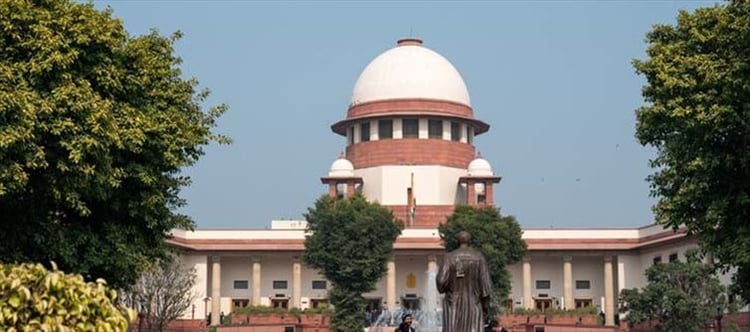
The supreme court on monday raised concerns about the "criminalization of politics" and inquired as to how someone convicted of a crime might be allowed to rejoin Parliament. As a result, a bench consisting of Justices Dipankar Datta and manmohan requested the indian attorney general's help with the matter.
In addition to the prompt resolution of criminal proceedings against MPs and MLAs nationwide, it was considering a Public Interest Litigation (PIL) brought by attorney ashwini Upadhyay, which called for a lifetime ban on guilty politicians.
Regarding the challenge to the constitutionality of Sections 8 and 9 of the Representation of people Act, the court requested comments from the Center and the election commission of india within three weeks.
"How can individuals return to parliament and the legislature once he is found guilty and the verdict is upheld? they must respond. Additionally, there seems to be a conflict of interest. It claimed, "They would be checking the legislation.
"We need to be educated on Sections 8 and 9 of the Representation of people Act," the bench said. Even though they can be ministers, government employees found guilty of corruption or treason to the state are not deemed fit for employment. The highest court ruled that it would be improper for a division bench (two judges) to revisit the case because a full bench (three judges) had already rendered a decision regarding the prompt resolution of criminal charges involving parliamentarians.
As a result, the court ordered that Chief Justice Sanjiv Khanna take up the matter so that a bigger bench could evaluate it.
Senior Attorney Vijay Hansaria, who is supporting the court as an amicus curiae, stated that several cases against MPs were still unresolved in spite of periodic instructions from the top court and high court oversight.
According to Hansaria, the PIL contested the constitutionality of Section 8 of the Representation of people Act, which caps a convicted person's disqualification period at six years, and called for the prompt resolution of such cases.
According to him, the petition also questioned whether someone with a criminal conviction could start a political party or hold a position inside one.
According to Hansaria, the supreme court issued orders in 2017 to establish 12 special courts across 10 states and to oversee the prompt resolution of outstanding criminal cases involving MPs and MLAs.
However, he said, the trial was proceeding at a very sluggish rate and the situation has remained appalling.
"After all of this, it is regrettable that 42% of current lok sabha members still face criminal charges. "Cases have been pending for 30 years," Hansaria stated.
In addition to the prompt resolution of criminal proceedings against MPs and MLAs nationwide, it was considering a Public Interest Litigation (PIL) brought by attorney ashwini Upadhyay, which called for a lifetime ban on guilty politicians.
Regarding the challenge to the constitutionality of Sections 8 and 9 of the Representation of people Act, the court requested comments from the Center and the election commission of india within three weeks.
"How can individuals return to parliament and the legislature once he is found guilty and the verdict is upheld? they must respond. Additionally, there seems to be a conflict of interest. It claimed, "They would be checking the legislation.
"We need to be educated on Sections 8 and 9 of the Representation of people Act," the bench said. Even though they can be ministers, government employees found guilty of corruption or treason to the state are not deemed fit for employment. The highest court ruled that it would be improper for a division bench (two judges) to revisit the case because a full bench (three judges) had already rendered a decision regarding the prompt resolution of criminal charges involving parliamentarians.
As a result, the court ordered that Chief Justice Sanjiv Khanna take up the matter so that a bigger bench could evaluate it.
Senior Attorney Vijay Hansaria, who is supporting the court as an amicus curiae, stated that several cases against MPs were still unresolved in spite of periodic instructions from the top court and high court oversight.
According to Hansaria, the PIL contested the constitutionality of Section 8 of the Representation of people Act, which caps a convicted person's disqualification period at six years, and called for the prompt resolution of such cases.
According to him, the petition also questioned whether someone with a criminal conviction could start a political party or hold a position inside one.
According to Hansaria, the supreme court issued orders in 2017 to establish 12 special courts across 10 states and to oversee the prompt resolution of outstanding criminal cases involving MPs and MLAs.
However, he said, the trial was proceeding at a very sluggish rate and the situation has remained appalling.
"After all of this, it is regrettable that 42% of current lok sabha members still face criminal charges. "Cases have been pending for 30 years," Hansaria stated.




 click and follow Indiaherald WhatsApp channel
click and follow Indiaherald WhatsApp channel